Medieval History
He became the legend when he arose with the First Triumvirate in 60 B.C. with Gnaeus Pompeius Magnus, known as Pompey the Great, and General Marcus Licinius Crassus, a man legendary for his greed and the first wealthiest man on Earth, where his amassed money is said to be comparable to $100.000.000.000 (hundreds of billions of dollars). In this three-part political team, Iulius was the political brains and the leader of the three where he amassed popularity with the Roman plebeians to overthrow the power of the Roman senate. Pompeius was the man to spread the war and glory to all the people outside of Rome, and Crassus funded it all. In fact, Crassus, who was so wealthy he literally paid for the entire military and political campaigning for Iulius, was merely told that he would be rewarded with fame, glory, and a say in the goings-on of the future Roman Empire, no doubt ruled by Iulius Caesar. Reason simply being that Crassus had virtually no political power nor any fame due to his plebeian birth, and his status as a general was nothing compared to Iulius and Pompeius' military careers by even this point.
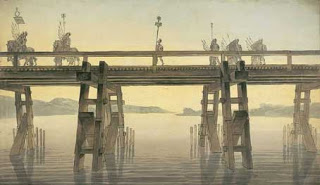 At this time, Iulius was known as a proconsul, but he had every motive to change that! And so the union of the three men was born. Because fame and glory was earned in the Roman Republic primarily by grand military conquests, a tradition set by some of the first generals at the beginning of Rome, Iulius marched out for the conquest of Gaul held by the Celtic tribes that settled there after the Roman defeat at the Battle of Allia around 390-387 B.C. At this time, Gaul was a Celtic territory occupying just about all of western Europe, such as France, Belgium, England, and more. This meant great fame for Iulius, as the previous Roman attempts to throw out the Celts failed quite miserably, but he would not. Grand battles ensued for years, close to a decade, and by 51 B.C. Iulius conquered Gaul. He even built a bridge to cross the Rhine during this time and showed the neighboring Germanic tribes known as the Teutones, Cimbri, and Ambrones, that the large river could not protect any of them from Roman retaliation. Up until this point, the Germanic tribes on the eastern side of the Rhine had been attacking Rome in unpredictable waves. Small tribes they were, but they wore Rome down over the decades, as Rome would later attempt to occupy the entire border to protect themselves, and fail. Iulius was conducting the first ever invasion of Britain when bad luck would strike his glorious triumvirate in the ribs.
At this time, Iulius was known as a proconsul, but he had every motive to change that! And so the union of the three men was born. Because fame and glory was earned in the Roman Republic primarily by grand military conquests, a tradition set by some of the first generals at the beginning of Rome, Iulius marched out for the conquest of Gaul held by the Celtic tribes that settled there after the Roman defeat at the Battle of Allia around 390-387 B.C. At this time, Gaul was a Celtic territory occupying just about all of western Europe, such as France, Belgium, England, and more. This meant great fame for Iulius, as the previous Roman attempts to throw out the Celts failed quite miserably, but he would not. Grand battles ensued for years, close to a decade, and by 51 B.C. Iulius conquered Gaul. He even built a bridge to cross the Rhine during this time and showed the neighboring Germanic tribes known as the Teutones, Cimbri, and Ambrones, that the large river could not protect any of them from Roman retaliation. Up until this point, the Germanic tribes on the eastern side of the Rhine had been attacking Rome in unpredictable waves. Small tribes they were, but they wore Rome down over the decades, as Rome would later attempt to occupy the entire border to protect themselves, and fail. Iulius was conducting the first ever invasion of Britain when bad luck would strike his glorious triumvirate in the ribs.
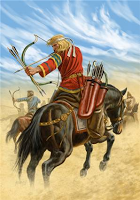
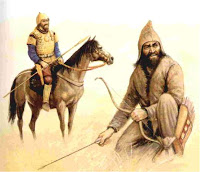 Although Iulius was victorious in all he did, Crassus, the wealthy general who was funding the entire campaign and the triumvirate itself, was killed in 53 B.C during an arrogant attempt to win more prestige for himself by marching across the Euphrates to conquer Parthia. The Parthians were one of the several ancient Persian tribes that existed prior to the beginning of the Persian entrance into Mesopotamia and the Iranian plateau around 2000 B.C. The Parthians were best known for chopping off the heads of men they thought were greedy and pouring molten gold into them, leaving their golden heads on pikes as warnings to the disgusting civilizations that might attempt to invade. To say that Crassus was defeated would be a monstrous understatement, as the Parthian's highly skilled cavalry mowed Crassus' mercenary infantry down like grass. There was no real battle, as Crassus' army served only to irritate these legendary warriors.
Although Iulius was victorious in all he did, Crassus, the wealthy general who was funding the entire campaign and the triumvirate itself, was killed in 53 B.C during an arrogant attempt to win more prestige for himself by marching across the Euphrates to conquer Parthia. The Parthians were one of the several ancient Persian tribes that existed prior to the beginning of the Persian entrance into Mesopotamia and the Iranian plateau around 2000 B.C. The Parthians were best known for chopping off the heads of men they thought were greedy and pouring molten gold into them, leaving their golden heads on pikes as warnings to the disgusting civilizations that might attempt to invade. To say that Crassus was defeated would be a monstrous understatement, as the Parthian's highly skilled cavalry mowed Crassus' mercenary infantry down like grass. There was no real battle, as Crassus' army served only to irritate these legendary warriors.
With this, Iulius knew he would soon run out of money for his own 40,000 Roman troops, and so he took a hiatus from his conquest of Britain and began his journey back to Rome by around 51-50 B.C. However, as Crassus was dead, more bad luck would have to come to him, because the saying "when it rains, it pours" seems to be true for most people more often than not. The Roman senate was certainly scared by Iulius' massive popularity, and they knew their power would be completely washed away if Caesar returned to Rome alive from so many victorious campaigns. For to say the Roman plebeians loved Caesar would be yet another understatement. The entire purpose of the triumvirate was to win the plebeians' hearts with popularity, as they consisted of over 99% of the Roman population and did not have any sort of fondness for the corrupt patricians, as they simply earned their political power and wealth by birth.
Being manipulated, Pompey the Great, who in his own right was a legendary general, was pushed by the senate to defect from the triumvirate he entered and defend the Roman senate, no doubt for "very good reasons." Iulius was absolutely brilliant, and some say he may have had some sort of attention disorder, like ADD, as he is always described as a highly energetic personality, always hopping from one task to another with great haste. Following Caesar took people a lot of adjustment. That may have been part of the reason why he immediately chose to literally march across the Rubicon in 49 B.C.! Almost instantaneously a civil war broke out, as his act was no less than pure insurrection. But Iulius Caesar would have it no other way, as he spent 10 years of his life earning glory to rule, why would he simply give up after all of that? The senate was not thinking properly, or perhaps they simply felt too comfortable up there in the senate, because they did not expect Caesar to be so bold.
Immediately Pompey set out against him, and in several glorious battles, Pompey the Great vs. Iulius Caesar conqueror of Gaul, Pompey and Caesar fought bitterly from Rome all the way to Greece and met in the final Battle of Pharsalus in 49 B.C., where Caesar won the civil war. Pompey survived and fled with some trust comrades, also taking his wife and son to Egypt, where Caesar already had his assassins waiting to strike. Pompey was publicly stabbed to death by Illas, Septimius and Salvius.???????????
Caesar, being the popular man, assumed total control of the entire Roman Republic and immediately began making changes all around, where his right to do so was allotted to him as he had cleverly announced himself as "dictator in perpetuity," meaning emperor forever. Many changes were made to reform Rome, and his vision granted him total power over the entire world, but just like Alexander, his life ended abruptly. In 44 B.C., the Roman senate finally grew fed up of this would-be emperor, and every one of them stabbed him, bloodying all of their hands equally. This resulted in a series of civil wars which would ironically lead to Caesar's vision of a real empire ruled by an emperor anyway. Irony is always fun! In this case, the consequences of Caesar's assassination and of the following civil wars led to a true empire ruled by an emperor, marking the official end of the Roman Republic!
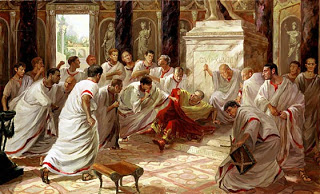 .....And so Imperial Rome was born!
.....And so Imperial Rome was born!
-
-
-
-
-
-
-
Up next:
Imperial Rome Part 1: Emperor Nero- The Man Who Fiddled While Rome Burned
- Imperial Rome Part 3: 3rd Emperor Caligula- The Man Who Lost His Mind
My other blogs are:http://religion-by-kyle.blogspot.comhttp://astronomy-by-kyle.blogspot.com 3rd Emperor Caligula The Man Who Lost His MindImperial Rome Part 3GENERAL BACKGROUND: Gaius (Caligula) Julius Caesar Augustus Germanicus... Yes, later in his...
- Imperial Rome Part 2: Ostrogoths And Visigoths- The Ancient Germans And An Expanding Rome
My other blogs are:http://religion-by-kyle.blogspot.comhttp://astronomy-by-kyle.blogspot.comOstrogoths and Visigoths The Ancient Germans and a Troubled Rome Imperial Rome Part 2The Goths of 5th and 6th centuries A.D. We've all heard of them, no doubt....
- Imperial Rome Part 1: Emperor Nero- The Man Who Fiddled While Rome Burned
My other blogs are:http://religion-by-kyle.blogspot.comhttp://astronomy-by-kyle.blogspot.com?Emperor Nero The Man Who Fiddled While Rome Burned Imperial Rome Part 1 Julia Agrippina Minor, Nero's infamous motherThe most narcissistic emperor to...
- The Ancient Republic Of Rome Part 2: The Pyrrhic War Against Rome
My other blogs are:http://religion-by-kyle.blogspot.comhttp://astronomy-by-kyle.blogspot.comThe Pyrrhic War Against Rome The Ancient Republic of Rome Part 2:PYRRHUS OF EPIRUS- 319/318-272 B.C.: Who doesn't like the vast army of a frustrated Greek...
- The Ancient Republic Of Rome Part 1: A Brief Essay On The Birth Of Rome On Palatine Hill
My other blogs are:http://religion-by-kyle.blogspot.comhttp://astronomy-by-kyle.blogspot.comA Brief Essay on the Birth of Rome on Palatine Hill The Ancient Republic of Rome Part 1Ancient Rome! Who has not learned some of the grand history of Rome? Isn't...
Medieval History
The Ancient Republic of Rome Part 3: Iulius Caesar and Pompey the Great
My other blogs are:
http://religion-by-kyle.blogspot.com
http://astronomy-by-kyle.blogspot.com??????
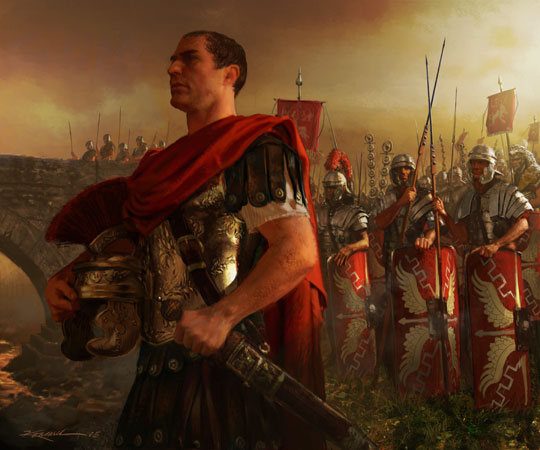 |
| The First Triumvirate Gaius Iulius Caesar Gnaeus Pompeius Magnus General Marcus Licinius Crassus The Ancient Republic of Rome Part 3 |
Iulius Caesar, or better known in English with the "J," as Julius Caesar, was born in 100 B.C. in the Republic of Rome, not long before the Roman Republic would become the true Roman Empire, in the sense where an emperor would rule the "empire." Iulius Caesar was legendary even without discussing his rise in political power, as his campaigns to spread the empire as far as Britain are enough to demonstrate his mark in history. Politically speaking, he actually paved the way to the end of the Roman Republic, where the senate ruled in a patrician-based democracy, whereas the more democratic Roman Empire would allow for more plebeian interaction in the government, and the emperor himself would act almost as a president to speak for the smaller people. This, as anyone can tell, obviously did not make the power-mongering patricians shout for joy, as Iulius attempted quite dashingly to wrest control from the senate, empowering himself as the beloved emperor of the people, and then stretch Rome across the entire Earth in his visionary conquest, not entirely unlike Alexander the Great's own conquest for Greek Empire in the 330s B.C.
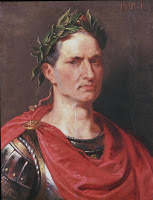 |
| Iulius |
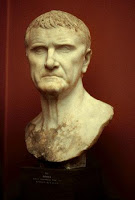 |
| Crassus |
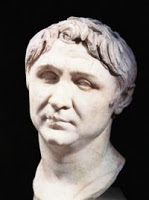 |
| Pompeius |
 At this time, Iulius was known as a proconsul, but he had every motive to change that! And so the union of the three men was born. Because fame and glory was earned in the Roman Republic primarily by grand military conquests, a tradition set by some of the first generals at the beginning of Rome, Iulius marched out for the conquest of Gaul held by the Celtic tribes that settled there after the Roman defeat at the Battle of Allia around 390-387 B.C. At this time, Gaul was a Celtic territory occupying just about all of western Europe, such as France, Belgium, England, and more. This meant great fame for Iulius, as the previous Roman attempts to throw out the Celts failed quite miserably, but he would not. Grand battles ensued for years, close to a decade, and by 51 B.C. Iulius conquered Gaul. He even built a bridge to cross the Rhine during this time and showed the neighboring Germanic tribes known as the Teutones, Cimbri, and Ambrones, that the large river could not protect any of them from Roman retaliation. Up until this point, the Germanic tribes on the eastern side of the Rhine had been attacking Rome in unpredictable waves. Small tribes they were, but they wore Rome down over the decades, as Rome would later attempt to occupy the entire border to protect themselves, and fail. Iulius was conducting the first ever invasion of Britain when bad luck would strike his glorious triumvirate in the ribs.
At this time, Iulius was known as a proconsul, but he had every motive to change that! And so the union of the three men was born. Because fame and glory was earned in the Roman Republic primarily by grand military conquests, a tradition set by some of the first generals at the beginning of Rome, Iulius marched out for the conquest of Gaul held by the Celtic tribes that settled there after the Roman defeat at the Battle of Allia around 390-387 B.C. At this time, Gaul was a Celtic territory occupying just about all of western Europe, such as France, Belgium, England, and more. This meant great fame for Iulius, as the previous Roman attempts to throw out the Celts failed quite miserably, but he would not. Grand battles ensued for years, close to a decade, and by 51 B.C. Iulius conquered Gaul. He even built a bridge to cross the Rhine during this time and showed the neighboring Germanic tribes known as the Teutones, Cimbri, and Ambrones, that the large river could not protect any of them from Roman retaliation. Up until this point, the Germanic tribes on the eastern side of the Rhine had been attacking Rome in unpredictable waves. Small tribes they were, but they wore Rome down over the decades, as Rome would later attempt to occupy the entire border to protect themselves, and fail. Iulius was conducting the first ever invasion of Britain when bad luck would strike his glorious triumvirate in the ribs.
 Although Iulius was victorious in all he did, Crassus, the wealthy general who was funding the entire campaign and the triumvirate itself, was killed in 53 B.C during an arrogant attempt to win more prestige for himself by marching across the Euphrates to conquer Parthia. The Parthians were one of the several ancient Persian tribes that existed prior to the beginning of the Persian entrance into Mesopotamia and the Iranian plateau around 2000 B.C. The Parthians were best known for chopping off the heads of men they thought were greedy and pouring molten gold into them, leaving their golden heads on pikes as warnings to the disgusting civilizations that might attempt to invade. To say that Crassus was defeated would be a monstrous understatement, as the Parthian's highly skilled cavalry mowed Crassus' mercenary infantry down like grass. There was no real battle, as Crassus' army served only to irritate these legendary warriors.
Although Iulius was victorious in all he did, Crassus, the wealthy general who was funding the entire campaign and the triumvirate itself, was killed in 53 B.C during an arrogant attempt to win more prestige for himself by marching across the Euphrates to conquer Parthia. The Parthians were one of the several ancient Persian tribes that existed prior to the beginning of the Persian entrance into Mesopotamia and the Iranian plateau around 2000 B.C. The Parthians were best known for chopping off the heads of men they thought were greedy and pouring molten gold into them, leaving their golden heads on pikes as warnings to the disgusting civilizations that might attempt to invade. To say that Crassus was defeated would be a monstrous understatement, as the Parthian's highly skilled cavalry mowed Crassus' mercenary infantry down like grass. There was no real battle, as Crassus' army served only to irritate these legendary warriors.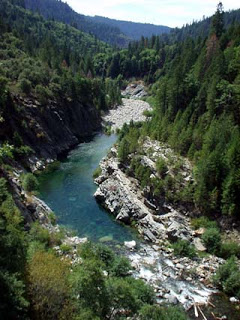 |
| The Rubicon River |
Being manipulated, Pompey the Great, who in his own right was a legendary general, was pushed by the senate to defect from the triumvirate he entered and defend the Roman senate, no doubt for "very good reasons." Iulius was absolutely brilliant, and some say he may have had some sort of attention disorder, like ADD, as he is always described as a highly energetic personality, always hopping from one task to another with great haste. Following Caesar took people a lot of adjustment. That may have been part of the reason why he immediately chose to literally march across the Rubicon in 49 B.C.! Almost instantaneously a civil war broke out, as his act was no less than pure insurrection. But Iulius Caesar would have it no other way, as he spent 10 years of his life earning glory to rule, why would he simply give up after all of that? The senate was not thinking properly, or perhaps they simply felt too comfortable up there in the senate, because they did not expect Caesar to be so bold.
Immediately Pompey set out against him, and in several glorious battles, Pompey the Great vs. Iulius Caesar conqueror of Gaul, Pompey and Caesar fought bitterly from Rome all the way to Greece and met in the final Battle of Pharsalus in 49 B.C., where Caesar won the civil war. Pompey survived and fled with some trust comrades, also taking his wife and son to Egypt, where Caesar already had his assassins waiting to strike. Pompey was publicly stabbed to death by Illas, Septimius and Salvius.???????????
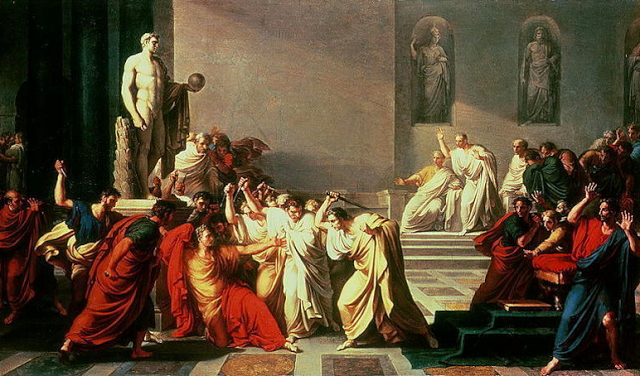 |
| Assassination of Caesar by the senate |

-
-
-
-
-
-
-
Up next:
Imperial Rome Part 1: Emperor Nero- The Man Who Fiddled While Rome Burned
- Imperial Rome Part 3: 3rd Emperor Caligula- The Man Who Lost His Mind
My other blogs are:http://religion-by-kyle.blogspot.comhttp://astronomy-by-kyle.blogspot.com 3rd Emperor Caligula The Man Who Lost His MindImperial Rome Part 3GENERAL BACKGROUND: Gaius (Caligula) Julius Caesar Augustus Germanicus... Yes, later in his...
- Imperial Rome Part 2: Ostrogoths And Visigoths- The Ancient Germans And An Expanding Rome
My other blogs are:http://religion-by-kyle.blogspot.comhttp://astronomy-by-kyle.blogspot.comOstrogoths and Visigoths The Ancient Germans and a Troubled Rome Imperial Rome Part 2The Goths of 5th and 6th centuries A.D. We've all heard of them, no doubt....
- Imperial Rome Part 1: Emperor Nero- The Man Who Fiddled While Rome Burned
My other blogs are:http://religion-by-kyle.blogspot.comhttp://astronomy-by-kyle.blogspot.com?Emperor Nero The Man Who Fiddled While Rome Burned Imperial Rome Part 1 Julia Agrippina Minor, Nero's infamous motherThe most narcissistic emperor to...
- The Ancient Republic Of Rome Part 2: The Pyrrhic War Against Rome
My other blogs are:http://religion-by-kyle.blogspot.comhttp://astronomy-by-kyle.blogspot.comThe Pyrrhic War Against Rome The Ancient Republic of Rome Part 2:PYRRHUS OF EPIRUS- 319/318-272 B.C.: Who doesn't like the vast army of a frustrated Greek...
- The Ancient Republic Of Rome Part 1: A Brief Essay On The Birth Of Rome On Palatine Hill
My other blogs are:http://religion-by-kyle.blogspot.comhttp://astronomy-by-kyle.blogspot.comA Brief Essay on the Birth of Rome on Palatine Hill The Ancient Republic of Rome Part 1Ancient Rome! Who has not learned some of the grand history of Rome? Isn't...
